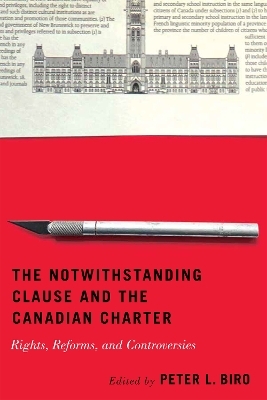
The Notwithstanding Clause and the Canadian Charter
Rights, Reforms, and Controversies
Seiten
2024
McGill-Queen's University Press (Verlag)
978-0-2280-2020-2 (ISBN)
McGill-Queen's University Press (Verlag)
978-0-2280-2020-2 (ISBN)
- Titel z.Zt. nicht lieferbar
- Versandkostenfrei innerhalb Deutschlands
- Auch auf Rechnung
- Verfügbarkeit in der Filiale vor Ort prüfen
- Artikel merken
The significance, effects, and legitimacy of Section 33 of the Charter have been vigorously debated. The Notwithstanding Clause and the Canadian Charter examines the NWC from all perspectives, asking who should have the last word on matters of rights and justice – the legislatures or the judiciary – and what balance liberal democracy requires.
Section 33 – what is commonly referred to as the notwithstanding clause (NWC) – was written into the Canadian Charter of Rights and Freedoms to allow Parliament and the provinces to provisionally override certain Charter rights.
The Notwithstanding Clause and the Canadian Charter examines the NWC from all angles and perspectives, considering who should have the last word on matters of rights and justice – the legislatures or the unelected judiciary – and what balance liberal democracy requires. In the case of Quebec, the use of the clause has been justified as necessary to preserve the province’s culture and promote its identity as a nation. Yet Quebec’s pre-emptive and sweeping invocation of the clause also challenges the scope of judicial review and citizens’ recourse to it, and it tests the assumption that a dialogue between the judiciary and the legislature is always preferable in instances in which the legislative branch decides to suspend the operation of certain Charter rights and freedoms. By virtue of its contested purposes, interpretations, operation, and applications, the NWC represents and, to an extent, defines both the character and the very real vulnerabilities of liberal constitutionalism in Canada.
The significance, effects, and legitimacy of the NWC have been vigorously debated within scholarship and among politicians and activists since the patriation of the Canadian Constitution in 1982. In The Notwithstanding Clause and the Canadian Charter leading scholars, jurists, and policy experts elucidate and prescribe reforms to the application of this consequential clause about which so much is written, and around which there is relatively little consensus.
Section 33 – what is commonly referred to as the notwithstanding clause (NWC) – was written into the Canadian Charter of Rights and Freedoms to allow Parliament and the provinces to provisionally override certain Charter rights.
The Notwithstanding Clause and the Canadian Charter examines the NWC from all angles and perspectives, considering who should have the last word on matters of rights and justice – the legislatures or the unelected judiciary – and what balance liberal democracy requires. In the case of Quebec, the use of the clause has been justified as necessary to preserve the province’s culture and promote its identity as a nation. Yet Quebec’s pre-emptive and sweeping invocation of the clause also challenges the scope of judicial review and citizens’ recourse to it, and it tests the assumption that a dialogue between the judiciary and the legislature is always preferable in instances in which the legislative branch decides to suspend the operation of certain Charter rights and freedoms. By virtue of its contested purposes, interpretations, operation, and applications, the NWC represents and, to an extent, defines both the character and the very real vulnerabilities of liberal constitutionalism in Canada.
The significance, effects, and legitimacy of the NWC have been vigorously debated within scholarship and among politicians and activists since the patriation of the Canadian Constitution in 1982. In The Notwithstanding Clause and the Canadian Charter leading scholars, jurists, and policy experts elucidate and prescribe reforms to the application of this consequential clause about which so much is written, and around which there is relatively little consensus.
Peter L. Biro is a lawyer, founder of Section 1, senior fellow of Massey College, centre associate of the UBC Centre for Constitutional Law and Legal Studies, and chair emeritus of the Jane Goodall Institute.
| Erscheinungsdatum | 01.04.2024 |
|---|---|
| Verlagsort | Montreal |
| Sprache | englisch |
| Maße | 152 x 229 mm |
| Themenwelt | Recht / Steuern ► Allgemeines / Lexika |
| Recht / Steuern ► EU / Internationales Recht | |
| Recht / Steuern ► Öffentliches Recht | |
| Sozialwissenschaften ► Politik / Verwaltung ► Politische Theorie | |
| Sozialwissenschaften ► Politik / Verwaltung ► Staat / Verwaltung | |
| ISBN-10 | 0-2280-2020-4 / 0228020204 |
| ISBN-13 | 978-0-2280-2020-2 / 9780228020202 |
| Zustand | Neuware |
| Informationen gemäß Produktsicherheitsverordnung (GPSR) | |
| Haben Sie eine Frage zum Produkt? |
Mehr entdecken
aus dem Bereich
aus dem Bereich
Der »progressive« Angriff auf Israel, Judentum und …
Buch | Softcover (2024)
edition TIAMAT (Verlag)
28,00 €
ein Vortrag
Buch | Softcover (2024)
Suhrkamp (Verlag)
10,00 €


